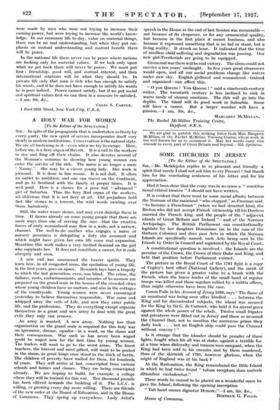A HOLY WAR FOR WOMEN [To the Editor of the
SPECTATOR.]
Sm,—In spite of the propaganda that is undertaken so freely by every party, the new spirit of service incorporates itself very slowly in modern institutions. Conservatism is the natural state. We are all hastening to it—even when we try to escape. Here, before me, is a fiery organ of Revolt. It is a call to the workers to rise and fling off their chains. It also devotes several of the Woman's columns to showing how young women can enter the service of the rich. The nurse is no longer a mere "Nanny." She may be a clever young lady. Her work is pleasant. It is done in fine rooms. It is not dull. It offers an outlet to ambition, and one can travel on the Continent, and go to Scotland with the family at proper times. It is well paid. Here is a chance for a poor but " advanced " girl of Suburbia. Thus the fiery Red organ of the workers, all oblivious that it is not fiery at all. Old prejudices hold fast like stones •in a torrent, the wild words swirling over them harmlessly.
Still, the water wears stones, and may even dislodge them in time. It dawns already on some young people that there are more ways than one of serving the race—that the creative forces of early womanhood may flow in a wide, not a narrow, channel. The well-to-do mother who engages a nurse or nursery governess is delegating a duty she assumed and which might have given her own life some real expansion. Meantime this work makes a very limited demand on the girl who supplants her. It does not constitute a career, for it ends abruptly and soon.
A new call has summoned the braver spirits. They learn how, in all Congested areas, the spoliation of young life, in the first years, goes on apace. Research lays bare a tragedy to which the last generation, even, was blind. The crime, the failures, costs, embarrassments, and miseries of to-morrow are prepared on the grand scale in the homes of the crowded cities where young children have no nurture, and also in the cottages of the countryside. Young women were never encouraged yesterday to believe themselves responsible. War came and whipped away the veils of Life, and now they enter public life, and the professions. They do everything except organize themselves as a great and new army to deal with the great evils they only can remove.
An army is wanted. A new army. Nothing less than organization on the grand scale is required for this holy war on ignorance, disease, squalor—in a word, on the slums and their consequences. War such as has never been waged could be waged now for the first time by young women. i he leaders will want to go to the worst areas. The finest teachers, the bravest and most gifted, will want to be posted in the slums, as great kings once stood in the thick of battle.
The children of poverty have waited for these, for hundreds of years. They will arrive at last, conscripted from various schools and homes and classes. They are being conscripted already. We are hoping to build, for example, a college where they will be trained for this war. Ten thousand pounds has been offered towards the building of it. The L.C.C. is willing, or growing every day more willing. There are friends of the new order at the Board of Education, and in the Mouse of Conunons. They spring up .everywhere. Lady Astor's speech in the House at the end of last Session was memorable—, not because of its eloquence, or for any ornamental quality, but because in the first place it meant business, and also because it expressed something that is no fad or stunt, but a living reality. It struck an hour. It indicated that the time of needless child suffering and degradation was passing. Our new girl-Territorials are going to be equipped.
Given real war there will be real victory. The slums could not survive a ten years' onslaught. In five years great clearances would open, and all our social problems change like waters under new sky. English girlhood and womanhood—trained and organized—can effect this.
"0 you Queens ! You Queens ! " said a nineteenth-century writer. The twentieth century is less inclined to sink in warm sands of steamy emotions. The elite will go into the depths. The timid will -do good work in Suburbia. Some will have a career. But a larger number will have a vaission.—I am, Sir, &c.,
MARGARET MCMILLAN.
The Rachel McMillan Training Centre,. Deptford, S.E. 8.
We are glad to publish this striking letter from Miss Margaret McMillan of the Rachel McMillan Training Centre, whcse work is too well known for us to commend it. May her words carry this, crusade to every part of Great Britain and beYond.—Ed. Spectator.














































 Previous page
Previous page